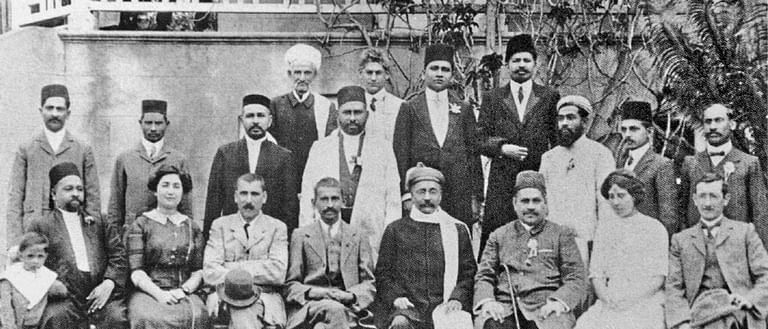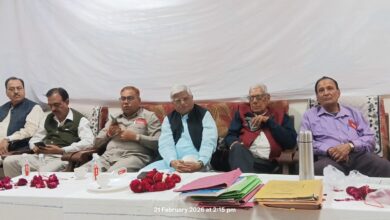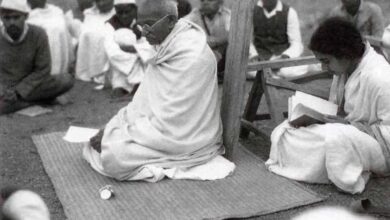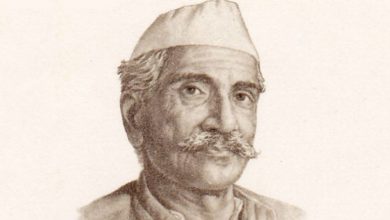Education should produce sensitive and ethical human beings
When Gandhi visited the nook and corners of the country, he realized that the Bharat that he imagined was much different from what he saw. There were multitudes of smaller and marginalized factions in the society who were struggling to make ends meet even after spending days of labour on farmlands under the British boots.
By Shrey Ostwal and Sandeep Pandey
The pivotal point of Mohandas Karamchand Gandhi’s journey to become Mahatma Gandhi began when his “political guru” – Gopal Krishna Gokhale – advised young Mohandas to travel around India. This rigorous journey was essential for Mohandas to understand his country and countrypersons better if he were to fight the inhumane and unempathetic British regime which had been looting India of its glory for about two centuries then. When Gandhi visited the nook and corners of the country, he realized that the Bharat that he imagined was much different from what he saw. There were multitudes of smaller and marginalized factions in the society who were struggling to make ends meet even after spending days of labour on farmlands under the British boots. Even though Gandhiji could have swallowed libraries to understand the culture and diversity in India but an experiential learning (the selling lingo used by many renowned Universities across the world today) in form of “Bharat Bhraman” gave him a heart wrenching first-hand exposure to pains of his fellow countrypersons. Therefore, throughout the freedom struggle people would follow his calls almost blindly because he could connect with them better than anyone.
We completely understand that we might not see the next Mahatma anytime soon, although we need one desperately in such tough and uncertain times. However, if we are to restore the glory of our culturally rich and diverse country, the education system of India must become the torch bearer. We have established NITs, IITs, AIIMS, IIMs and many other institutes that have global standing. However, there is a huge chasm between the highly educated and the illiterate, half-literate and badly literate (sub-standard education, resorting to unfair means) masses. The villagers of Bastar in Chhattisgarh, the farmers protesting for almost a year now near the capital’s borders, the women demanding right to enter temple in Kerala and the ones protesting against the CAA-NRC, the people from the north-east, the transgender community, the Dalits and minorities in rural and urban India are large chunks who are content living on the crumbs of modern education driven development process. The biggest question staring at us right now is how could education bridge this enormous gap? While there are many capable experts of the field and equally competent bureaucrats scratching their heads, nobody has a clear answer.
One suggestion to bridge the gap between the elite India and the common person is to develop empathy and what better place to start than from school. And, as per the study on empathy among individuals across more than sixty countries conducted by William J. Chopik, Ed O’Brien and Sara H. Konrath, India ranks at thirty-fifth position. We are not doing bad, but we are not touching the heights either. Unlike us, other countries such as the US are focussing on ensuring that their future citizens have a higher EQ (Emotional Quotient) with the help of initiatives such as the Yale Centre of Emotional Intelligence. Here we offer our experiences from a course of Social Movements being offered at some IIMs for the last few years.
The course attempts to develop an understanding among students that movements are not always disruptive and some of them have played important roles in addressing the issues of injustice in society. Dissent is an important ingredient of democracy otherwise democracy may degenerate into authoritarian rule. Moreover, as future corporate managers, the students should evince holistic understanding of any unpleasant situation where the corporation is adversely affecting the lives or livelihoods of local community and be in a position to sensitively resolve the issue not just in the interest of the corporation but also of the common people. The students learn about the struggles of traditional communities, adivasis to save their natural resources from exploitation by the corporates, hand in gloves with the government. They learn about the rights of marginalised communities like women, Dalits, LGBTQIA+ so that they can be treated equally. They learn that any case of sexual harassment should not be pushed under the carpet for the fear of brining bad name to the institution but must be dealth with squarely. They learn about the similarities between black rights in United States and Dalit rights in India and how Martin Luther King was described as an ‘untouchable’ in South India during his visit. They learn about movements for political democracies, some of which have been successful like in Nepal and South Africa and some which are still far away from their goal like Palestine and Tibet. They learn about how Muslim women came out to defend their right of citizenship during the anti-CAA, NRC movements as well as about the state of American farmers and how they have been deceived by laws similar to ones being forced upon farmers in India. Finally, they learn how great traditions of Kabir, Meera, Sai Baba, Guru Nanak, Swami Vivekanand and Mahatma Gandhi have held India together and their ideologies have worked as a bullwork against any attempt to divide the society on communal-caste lines.
An important feature of this course is that there are no examinations in it. Students have to make a presentation in the class on any movements of their choice. They can even choose ones not covered formally by the course. They interact with an activist to understand the movement and report their learnings in a reflective journal. The most important assignment of the course is to understand the lives of marginalized in India by connecting with one family at a personal level belonging to socio-economic weaker category than theirs and try to do something in their lives which would bring a qualitative change in psychological, material status of the family. Suddenly students start viewing their domestic help or staff in their hostels not merely as paid employees but as human beings. A number of students not only helped the children of such staff acquire good quality mobile phones but also taught them how to use the sophisticated devices so that they could study during times of lockdown. The students’ testimonies provide us confidence in saying that it has helped them to see the world around them in different light. They might not give sensational social media or mass media content, but they understand their responsibilities towards the society better than prior to taking this course. We are happy to see that the corporate leaders of tomorrow are on a path to become sensitive towards society they are going to live in. We cannot deny the fact that there is a huge role of internet to spread the knowledge about sustainable initiatives, movements across communities etc. but we strongly believe that to search this information, an individual must have a push from inside and a stronger emotional intelligence accompanied with empathy could be the driving factor behind the same.
Must Read :
It is not going to be easy. The students, schools or activists might not be interested in this idea at all. There could be several operational challenges as well in getting the activists given that they are always running from place to another. But the one thing that Covid has given us is more efficient remote connectivity. So why not leverage that. Despite all the foreseeable and unforeseeable challenges, even a single success story from one corner of the country would make it a better place than what it used to be.
(By Shrey Ostwal and Sandeep Pandey ,
Contact numbers: 9209864500, 0522 2355978
e-mail ids: shrey.ostwal20@iimb.ac.in, ashaashram@yahoo.com)
(Note: Shrey Ostwal is PGP student at Indian Institute of Management, Bengaluru and Sandeep Pandey has taught Social Movements at IIMs at Ahmedabad, Bengaluru and Indore.)




